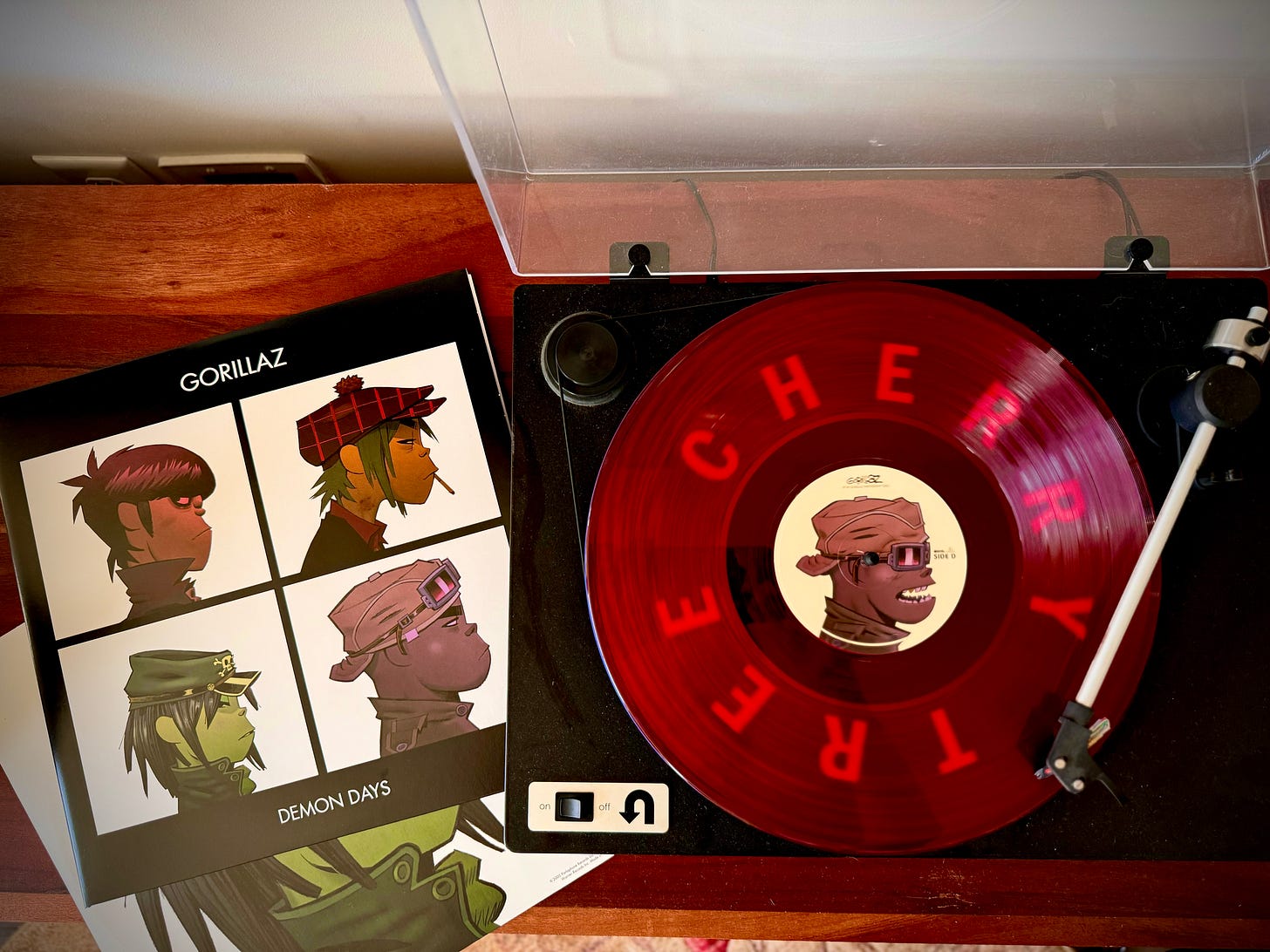Listen along on Tidal or Spotify.
We made it. I made it. A frenetic week of work, alone with the creatures. We are all alive and thriving – a minor miracle. But hey, a saint only needs three, right?
One of the recurring thoughts I've been having over the past year or so is that it's incredibly easy to forget and lose track of how fortunate we are to have help and systems that support us. The scaffolds we work so hard to erect and the people we come to rely on can become expected, as though the whole system were natural.
It isn't. And when pieces are pulled from the edifice, weakening it just enough for it to wobble, the sudden recognition of the absence can be quite destabilizing. Suffice it to say, I'm very happy – for many reasons – that Audra is back home after being gone this week for a work trip.
This will likely be a short OTR and I'm not apologetic about it. For a long time, I've held myself to invisible, imagined standards that I suspect other people have for the work I do. Despite my seeming iconoclasm, there's a deep seam of people-pleasing in me. I want you to love me. Hell, I get hung up on writing emails, because I want each one to be a bespoke work of art, savored by the recipient. (I know.)
Lately, I've been moving slowly into a new era, where I'm just doing what I want to do. If you like it, that's amazing. But fuck it, I'm going to do it whether you do or not. You're most welcome along for the ride.
Each of us has about a decade, give or take, that serves as our musical foundation. For men, this will be roughly the years between 14 and 25. Women, because they are more evolved creatures, develop more quickly and that window shifts to 12 to 23 or so. During those years, the music we're exposed to and internalize becomes our musical home base. It may not remain our favorite music – we may move beyond it, refine our tastes in ways that may not be entirely predictable given that core sensibility.
For me, these years were 1995 to 2006 or so. Some of this foundational music still pulls at me (witness my frustration with not getting Oasis tickets when they went on sale this week and the budding realization that I'm going to spend stupid money to buy tickets on the aftermarket), but some of it retains its space in the database without having much interest to me at all (see the crystal clear memory of seeing the debut of "Smooth" live on MTV, knowing instantly that the song was going to be a monster hit).
As I was thumbing through my records this morning, determining what to listen to, I noticed how much of the music I have was released in this window – and how many of those records I know note-for-note but rarely listen to anymore. So I'm going to sprinkle in some of these records over the next several OTRs.
Here's the first: Gorillaz's Demon Days.
Damon Albarn strikes me as a restless kind of guy. Blur was one of the leading Britpop bands, a distinctly English flavor of the genre. (There's an interesting discussion to be had about whether Oasis or Blur were more English; Blur generally gets the not because they were more literary and the upper middle-class London accent came through, but Oasis were a different kind of English: working class, hardscrabble, blunt and brutish in comparison to the posh boys of Blur.) Nevertheless, if you listen carefully to Blur, you see Albarn pushing against the box the band put him in.
Every band has a character, a sensibility. It's more than just the accumulated tastes of the bandmembers; each grouping of musicians has a natural musical vocabulary. And so, on nearly every Blur album after Parklife, you'll find a song that didn't belong. It wasn't a Blur song. I'm not saying it was a bad song, so much as it was like finding a Stephen King short story mashed into a Raymond Carver collection.
So when Gorillaz first burst onto the scene in 2001, my first thought was that Albarn finally got so bored he wanted a silly outlet for his Island of Misfit Toys songs. I mean, Gorillaz announced itself as a cartoon band.
I first heard "Clint Eastwood" in February or March of my sophomore year of college and promptly added it to party playlists. But the eponymous first album was uneven, with some really good tracks and a lot of things that badly needed an editor or an executor. I can't claim I was surprised: this often happens when a successful musician launches a side project. Lots of ego and a belief that anything he or she creates is magic – without realizing that it was the other members of the main band that tethered him to quality. It was the very limitations he was trying to escape that helped make him great.
Demon Days was released right after I graduated from grad school, ushering me into a year of drift before starting law school. I initially moved to Cleveland (note: never do this, it is a bad idea) to reconnect with bandmates and become a rockstar. That didn't pan out and I ran out of money, leading me to get a job grantwriting at a nonprofit back in Pittsburgh and return to a civilized city.
I listened to Demon Days pretty frequently during this time, whether driving to work (a 45 minute commute) or while writing mind-numbing government grant applications. My main recollection of the album at the time was it was suitably dark and it was easy to keep in the background as I worked.
Albarn switched up the team for Demon Days, swapping out Dan, The Automator for Danger Mouse, adding MF Doom (always a good idea), and had a revolving cast of collaborators. The album is better than Gorillaz, but still pretty uneven – especially listening to it this morning. The opening of the record feels tremendously weak to me. "Last Living Souls," "Kids With Guns" (amazing bass sound notwithstanding), and "O Green World" are...fine. They strike me as odd choices to kick off the album.
Things pick up with "Dirty Harry" (enough with the Eastwood references, Damon, and good god, what's with the choirs? "Tender" was enough) and the transcendent "Feel Good Inc." But the album never really crests. There are a number of highs, but an equal number of lows. Every time I feel like I'm settling into a groove with the album, something comes on that jars me into paying attention, in a bad way.
And yet, there's a part of this album that has sinewed its way deep into my sensibilities. Something familiar, comfortable to the point of being unquestioned. It holds a different place in my head than does Blur, although I love Blur and enjoy Gorillaz.
I wonder sometimes how much of our understanding of the world is informed by things we don't hate. Songs, books, tv shows, movies, people that are fine. Not bad enough to actively excise from our lives. As I'm listening to Demon Days, I find myself wondering why I'm wasting my time on something that is fine.
The implications of this are radical. If we follow it to its end, how much of our day-to-day lives would we need to cut out? How many difficult conversations or awkward derilictions of relationships does it require?
Would it help us get closer to a focused and fulfilled life? How ruthless must we be.





